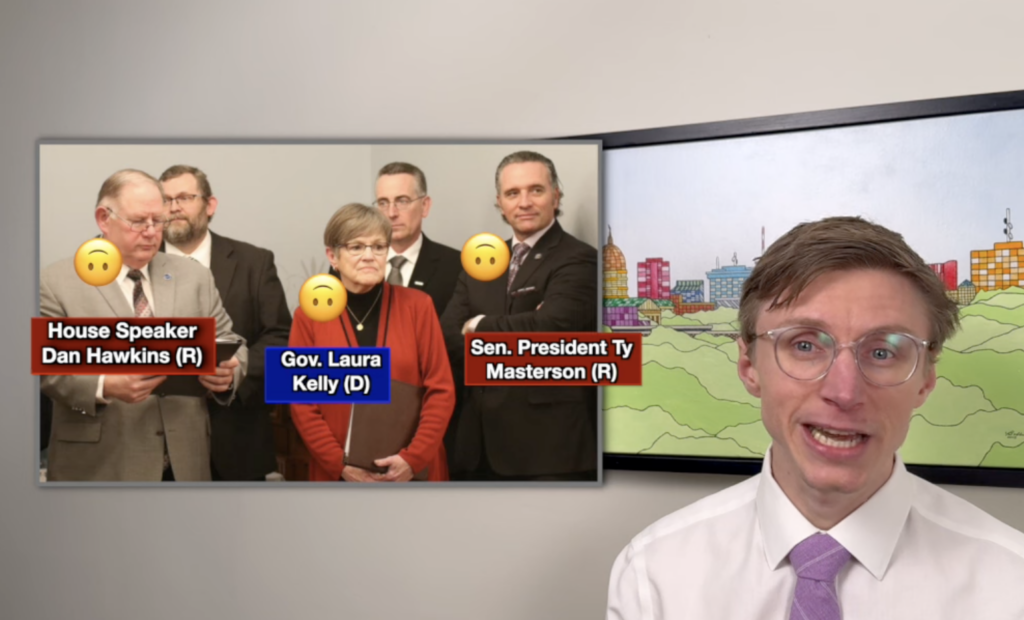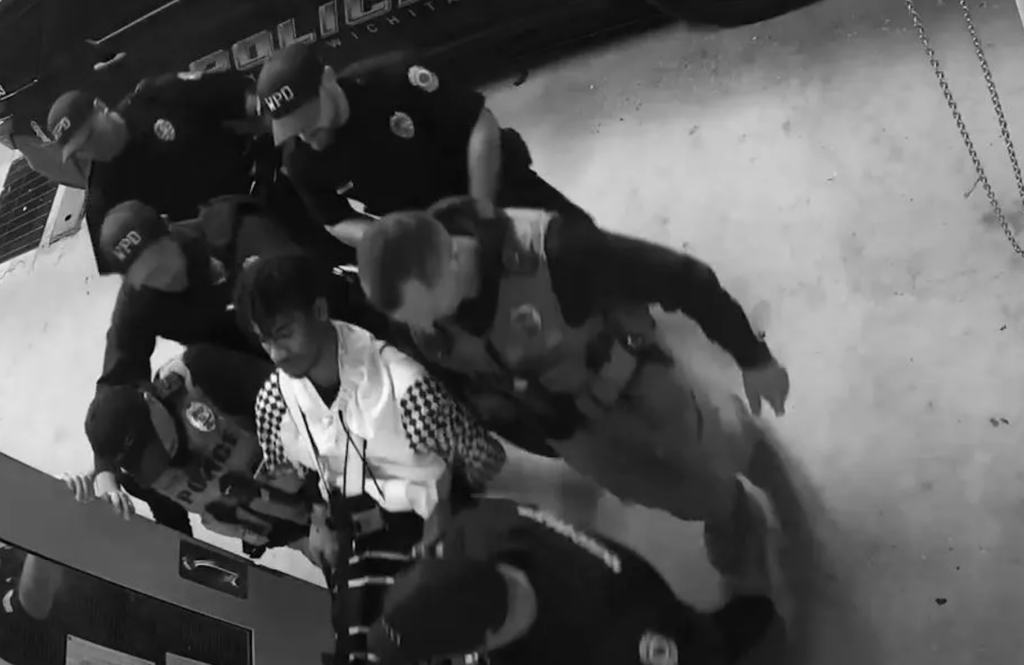THC beverage boom faces Missouri crackdown amid regulatory concerns, safety risks
A new report shows Missouri has the potential to pull in $75 million in annual THC drink sales, dependent on how state leaders and law enforcement respond to the fast-growing, unregulated market.

Karen Brady, the mother of Mighty Kind owner Josh Grigaitis, waits to talk to shoppers at Fresh Thyme grocery store in St. Louis about the company’s hemp THC seltzers (photo submitted)
A recent economic study on THC beverages found the industry has the potential to reach between $9.9 billion and $14.9 billion in national sales.
In Missouri — where the product faces attacks from law enforcement, state legislators and local governments who say it’s part of a public health crisis — that potential is $75.4 million annually.
“That’s the potential if you normalize this and provide consumers with access nationally,” said economic analyst Beau Whitney, whose study titled “The U.S. THC Beverage Report” was released last month.
Whitney is talking about products like the cans of low-dose THC seltzers that Missouri companies including Mighty Kind, Triple and URLit are producing. They’re currently found in bars, restaurants and stores like Randall’s and Total Wine.
Whitney estimates that in 2024, actual sales nationwide were between $1 billion and $1.3 billion – with 76% of that being hemp-derived THC beverages and 24% being products sold in marijuana dispensaries.
For the marijuana industry, the estimated $270 million in THC beverage sales in dispensaries only represented about 1% of the industry’s total sales in 2024.
Most brands average $2 million per year, the study found, while top brands can easily exceed $10 million or more in annual sales.

Beau Whitney’s economic analysis forecasts overall growth of THC beverages in 2025 of 25% (Screenshot of Whitney’s report)
Joshua Grigaitis, owner of St. Louis-based Mighty Kind Co., which makes various kinds of hemp seltzers, says Whitney’s numbers are in line with what he’s seeing in the market.
Mighty Kind was among the first THC beverage products in Missouri, and Grigaitis has seen many brands pop up over the last year. Now, he said the competition to get products in bars and restaurants is “full on.”
“It’s a great sign of growth for the whole space,” Grigaitis said. “It’s bringing awareness and credibility. Lots of brands are paying their lawyers to lobby for this. It’s not just us and a couple of the brands anymore.”
In Missouri, THC beverages are legal but completely unregulated by any government agency — which means there’s no age restriction on who can buy them. Distributors and retailers have self-imposed the same regulations they use on alcohol products, by requiring testing certification and that buyers have to show ID that they’re 21 or older.
While the Missouri legislature attempted to pass regulations for THC beverages in the spring, the proposal drew heavy opposition – and ultimately failed – because it would have prohibited THC edibles, vapes and other products from being sold outside of dispensaries.
Catherine Hanaway, who was sworn in as Missouri’s new attorney general this month, has vowed to make it a top priority to “utilize all vested authority in this office to attack the problem head on,” said James Lawson, her deputy chief of staff.
“Our focus is on the health and safety of Missourians,” Lawson said. “This is an unregulated industry that makes untested, unknown substances available to the public without any oversight, including children where we think it’s particularly detrimental.”
Potential Missouri regulations
Whitney’s report forecasts overall growth of THC beverages in 2025 to be 25%.
“This would be more aggressive given the trajectory of the market, however, there is a tremendous amount of uncertainty at both the federal and state levels that could inhibit the growth potential of the industry,” it states.
Many are watching the debate in the U.S. Senate to potentially ban hemp THC products. By the end of this year, Whitney anticipates there will be “greater clarity” on a regulatory framework for hemp-derived THC, and in 2026, there will be an acceleration of the growth.
Currently, THC beverages are legal in 28 states and legal but restricted in another nine, according to the report. They can only be sold in marijuana stores in seven states, and they’re illegal in six states.
This spring, Steven Busch, owner of Krey Distributing in the St. Louis area, was a key player in trying to get Missouri regulations passed for not only beverages but also edibles and vapes. Nowadays, THC Liquor, a national brand, is a major item for his company, he said.

Hemp THC beverages can be sold legally in 28 states outside of the marijuana dispensary system. Nine states restrict the sale of THC beverages by limiting the amount of THC in the beverages, and seven allow them only to be sold in dispensaries. They’re illegal in six states (Screenshot of The U.S. Beverage Report by Whitney Economics)
However, Busch ultimately opposed a bill he initially backed because the amended proposal would’ve allowed for the continued sales of THCA flower.
THCA flower looks and delivers the same high as marijuana buds, but the main difference is that it’s harvested in a way that allows it to be classified as hemp. Since hemp is not a federally controlled substance, it’s being sold in some smoke shops and hemp stores in Missouri.
However in June, former Missouri Attorney General Andrew Bailey sent several cease-and-desist letters to companies selling THCA flower, threatening legal action if the companies continue to sell it.
Busch said state lawmakers need to either pass legislation that regulates hemp-derived THC products this year or enact a total ban.
“That would impact me in a negative way, but I think we have to think in terms of consumer safety and kids getting hold of these products,” Busch said. “So, yeah, if we can’t figure it out, then I think we need to ban it all. And I hope it doesn’t come to that.”
Brian Riegel, owner of URLit beverage company, has a hemp farm near Washington, Mo., that will soon be able to produce enough harvest to sustain his two THC businesses, he said. He believes Whitney’s numbers are promising.
For the past four years, Riegel has been involved in stopping legislation that would require his beverages and edibles to only be sold in marijuana dispensaries. That would ban his products because only items that come from licensed marijuana cultivators can be sold in dispensaries.
This year, Riegel said he’s excited about initiative petitions that would ask voters next year to allow marijuana and intoxicating hemp products to be sold in the same stores as alcohol and tobacco.
He also hopes lawmakers at a minimum will pass requirements on age gating, childproof packaging and making sure every package identifies who is the manufacturer and distributor.
“Those are three very minimalistic things that should be a no-brainer thing to get done,” said Riegel, who is also a leader with the Missouri Hemp Trade Association, “and will cost nobody anything, but could give law enforcement the proper channels to penalize somebody if they’re misbehaving.”
Grigaitis agrees with Riegel.
“If they were just to start labeling and regulating the packaging, you would start holding people accountable,” he said. “Right now, it’s the wild west. As soon as there are even five rules on a piece of paper that everybody can see, everybody’s going to fall into place with those because you don’t want to be left out.”
And he also agrees with Busch that THCA flower shouldn’t be included in the regulation conversation yet. The biggest reason, Grigaitis said, is that there’s no real consensus on the definition of THCA flower, and that needs to be agreed upon before it can be regulated.
“There needs to be a solution to that one before it’s allowed,” he said. “I’m not saying close the door, but that I could say that about a lot of things. If the drinks have something figured out, then let them through.”
Missouri Independent is part of States Newsroom, a nonprofit news network supported by grants and a coalition of donors as a 501c(3) public charity. Missouri Independent maintains editorial independence. Contact Editor Jason Hancock for questions: info@missouriindependent.com.




